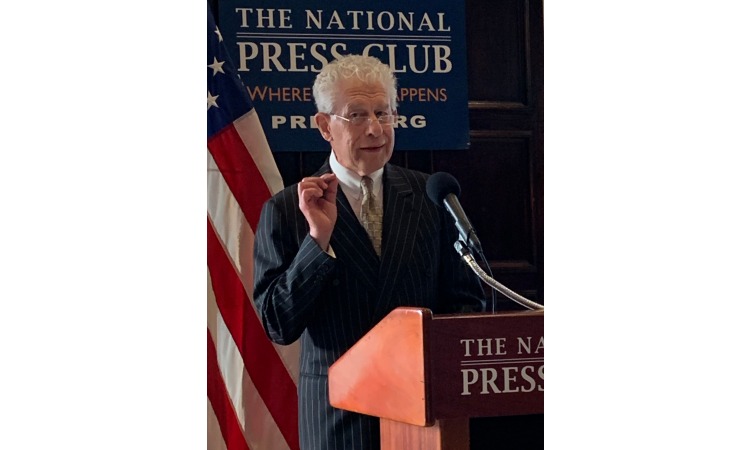June 11, 2019 – Although pharmaceutical advertisers have been able to stop legislation to eliminate or reduce the deductibility of drug advertising as a business expense in the past, the times, politics and a pressing need for revenue have changed the equation, according to Jim Davidson, chair of The Advertising Coalition. “It is very much one of the most immediate threats that I have seen to advertising in a long, long time,” he said during his keynote address to the Coalition for Healthcare Communication Rising Leaders Conference on Healthcare Policy held last month in Washington, D.C.
Davidson noted that a change in the majority party in the House following the 2018 midterm election has resulted in a sharp increase in hearings. “Democratic committees in the House that have jurisdiction over healthcare have held 14 hearings on drug pricing and marketing in just four and a half months,” he said. Further, members of this Congress – the House and Senate combined – have introduced 110 bills focused on marketing of drugs. “That is a monstrous number in any Congress in that narrow a subject area,” he noted. “This shows you how the message has changed very quickly – how the focus of the House under Democratic leadership can change the field we are playing on.”
With members seeking to find revenue following recent tax cuts and a growing national deficit, there is increased interest in eliminating the provision allowing pharmaceutical companies to deduct advertising as a business expense. “To give you an idea of the significance of this possibility – this came up in 2009 during the debate over the Affordable Care Act, and there was a period of time there when we weren’t sure we could hold them off,” Davidson said. “The price tag? $37 billion over 10 years, just to disallow a portion of pharmaceutical advertising expense. That’s a big number for a relatively small segment of all advertising.”
Without taxing advertising per se, he explained, “Congress can say that you can no longer deduct 100 percent of your advertising costs. How about 50 percent? 25 percent? They are looking for ways to raise revenues – that is one of the biggest challenges that this industry has. The less you can deduct as a business cost, the more net income you have, and the more you are going to get taxed. That is the lever that they are working with right now,” he noted.
Using this lever has been attempted before, but this time, there are additional pressures on Congress to find revenue. Davidson remarked that two staffers on the House Ways and Means Committee, both of whom have been reliable supporters of this industry for a long time, now report that their representatives are saying “there is a lot of pressure for money. We’re not sure where we are going to get additional money to run programs, the deficit is running up, we’ve got to push someplace,” and so, Davidson stated, “they are coming back to this.”
Further, a high-ranking House member told Davidson that other members are latching on to the viability of eliminating the ad tax deduction for the pharmaceuticals industry. This individual said, “I’m hearing from a lot of the members – you’d better round them up and start working on them because you’re in trouble,” Davidson reported. “That’s quite a message to get from someone who is a die-hard supporter of advertising. He said ‘you’ve got a problem.’”
On the Senate side, Sen. Jeanne Shaheen (D-N.H.) has introduced S. 73, the “End Taxpayer Subsidy for Drug Ads Act,” which would “disallow in its entirety the business expense deduction for DTC advertising,” he reported. “It hasn’t been scored. My guesstimate is that it won’t reach $100 million, but it will get very close. That is a lot of money, and it’s got a lot of Democratic support, including 21 other Democratic senators – a significant number of co-sponsors for any bill,” he commented. He also noted that if industry loses the deductibility of DTC advertising, “we are going to lose all advertising.”
“I give you these numbers to give you a sense that what you may have understood about the threat to advertising two years ago or four years ago – forget it,” he remarked. “Times, politics and money have changed, and the framework for this has changed. … That should awaken the industry.”
The best way to fight back, Davidson told Rising Leaders attendees, “is to go out and meet with members there [in home districts] and here [in Washington], and try to link folks like you who buy or sell advertising, who create advertising, media folks who depend on advertising, and get them all pointed in the same direction,” he said. “It’s critical to do this, because … all that matters is whether or not constituents of members on Capitol Hill hear the message, understand the importance locally in their districts and in their states, and believe that advertising should remain untaxed and unrestricted.”
He asserted that “every member of Congress needs to get that message, because we are hearing from members that the game has changed. … so, we need you to step up and get [more involved] or this is going to go down,” he stated.
Davidson also provided a specific call to action: “Each one of you has one member in the House of Representatives and two Senators. My charge to you all is starting tomorrow, reach out to the offices of those three members of Congress, and find out who the health staffer is, and the tax staffer, and introduce yourself. Send them an e-mail telling them what you do and why you do it,” he said.
These members of Congress “need to understand that you have a financial interest in this, that people’s jobs depend on it and that you are part of the fabric of this economy. Remind them that if you start taxing something that drives sales of products – any products – then you’re going to have less advertising and less sales. That’s Econ 101, but a lot of members don’t see it from that point of view, and that’s why I am appealing to you to start this.”
It is crucial for Rising Leaders attendees and all in the industry to deliver this messaging to their members of Congress, Davidson noted. “I think we are in a much stronger position to talk about what it does to the economy, and to jobs all over the country. What job in this country is not directly or indirectly affected by advertising and the sales revenues that advertising generates?” he asked. “That’s a message for members that they can understand. That is how this ripples through the economy.”
“We’ve been fighting this fight on general advertising for quite a long time,” he said, [Previous battles] were easy compared to where we are right now. It has changed, and it has changed dramatically, so when [the Coalition for Healthcare Communication] or any other association you are a part of reaches out to you saying we need your help, step up to the plate and call, write, telegram, e-mail every staffer on the Hill, whatever you have to do.”




